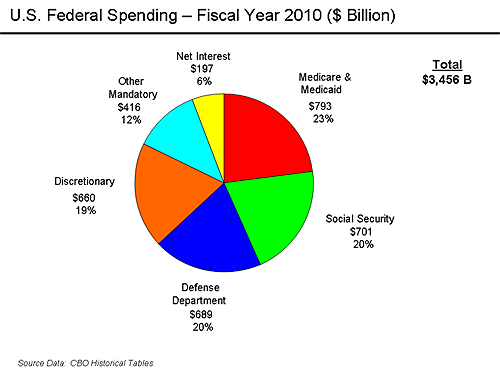The social-democratic party
There is no social-democratic left-wing party that will challenge the following beliefs:1. Should the US invest in and maintain a huge military that will be able to win 3 wars in 3 global arenas, even though it is in a huge deficit and the DOD is one of the largest money guzzling monsters in the budget (20% DOD + about half of the discretionary budget).
 | |
| U.S. Federal Spending - FY2010. The image was taken from http://www.economicpopulist.org/files/u1/U.S._Federal_SpendingFY2010.png |
2. Should the US have a government run healthcare system that will provide healthcare to every individual regardless of their socioeconomic ability to pay the fees? What the Affordable Healthcare Act (AKA Obamacare) did was just make more people get coverage, with the huge benefit of millions of more customers to the insurance companies. Studies have shown that a government run healthcare system has lower overhead and obviously no need to show profit, which will lower expenditure on healthcare in the long-run. Most countries in the OECD have one sort or another of government healthcare system, lower costs, and higher health-related indices. Not to mention that universal coverage will allow more people to start their own businesses without the fear of leaving their existing insurance plan.
 |
| Healthcare: life expectancy at birth vs. annual healthcare cost per person. Image from: http://www.economicpopulist.org/files/u1/ushealthmoneyvslife.jpg |
The libertarian party
On the other end of the scale, there is no truly libertarian right wing party that will aim at reducing government to the mere basics. An ultra libertarian party would challenge the following:1. Why does the government have to control immigration? Let the market regulate the immigration - if there are jobs for immigrants, great, let them have these jobs and grow our economy, and if there aren't, then immigrants will not have an incentive to come. If the market regulated immigration, the state would not spend so much time and money in protecting its borders, checkpoints and ports of entry against it, would not issue visas, and would save tons of money by eliminating all the agencies in charge of regulating immigration and fighting illegal immigration. This would also help reduce wages (and minimum wage laws should be eliminated anyway, by libertarian thinking), which would improve the competitiveness of American manufacturers in the global market.
2. What do social issues have to do with government? In a truly libertarian way of thinking, social issues like abortions should never be decided by a central government or politics. Indeed, some libertarians think this way, but most Tea-Party "libertarians" are also ultra-conservative and ultra-religious. So, they believe that the government should stay out of their pockets when it comes to taxes, but should probe into women's decisions and vaginas (sometimes quite literally) when it comes to abortions. A guy wants to marry a dude? Go ahead, pal. A girl wants to marry the woman of her dreams? Great (just send me the video of your wedding night, please :-)). A threesome or foursome want to marry? Be my guests. A truly libertarian way of thinking, as Ayn Rand's was, ignores any orders from a "higher being", be its source the government or god.
3. Why should the federal government spend money on military, social security and healthcare? Why should it even run a budget of its own? While some ultra-right fringes of the Republican party call for the elimination of social security and medicare, which will save about 40% of the federal budget (see pie chart above), they fail to use the same logic with respect to the military (another 20% + discretionary). A military is only needed to deter enemies and win wars, but the market usually runs much smoother and with less friction when there are no wars or international tensions. Moreover, wars are extremely expensive, and America will save huge sums of money if it stopped intervening in the affairs of the world and went back to its initial policy of withdrawing from the affairs of the old world, as practiced until the beginning of the 20th centuries. Other cuts that would make sense in the libertarian way are cuts to infrastructure development: either the market builds the roads and trains our future workers in schools, or there is no need for these infrastructures and schools in the first place, thus they should be eliminated from the budget. If you truly believe in the libertarian way of thinking, you can eliminate upwards of 85% of the federal budget, perhaps even all of it.